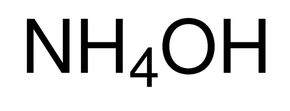Ammonium Hydroxide
Ammonia Solution ca. 25% NH3, (30504)
analytical Reagent, Reag. ISO, Reag. Ph. Eur.
General Information
- CAS Number
- 1336-21-6
- Grade
- Other
- Reag. Ph. Eur.
- Synonyms
- Ammonia aqueous
- Ammonia water
- Ammonium hydroxide solution
Physical Properties
- Boiling Point/Range
- 37.7 °C (1,013 hPa)
- Color
- Colorless
- Density
- 0.90 g/cm3 (20 °C)
- Flashpoint
- Not applicable
- Melting Point/Range
- -92 °C
- Odor
- Stinging, Ammoniacal
- Partition Coefficient
- -0.64
- pH
- Alkaline, undiluted
- Physical Form
- Liquid
- Solubility in Water
- Completely miscible
- Vapor Pressure
- 837 hPa (20 °C) hectopascal
Safety Information
- Chemical Stability
- Stable under recommended storage conditions.
- Evaporation Rate
- No data available
- Flammability
- Not applicable
- Ignition Temperature
- 630 °C
- Incompatible Materials
- Acids, Halogens
- Oxidizing
- The substance or mixture is not classified as oxidizing.
- Self Ignition
- 651 °C
- Thermal Decomposition
- No decomposition if used as directed.
International Transportation
- Chemical Class
- 8
- Harmonized System Code
- 28142000
- Packing Group
- III
- UN Number
- 2672
General Information
- CAS Number
- 1336-21-6
- Grade
- Other
- Reag. Ph. Eur.
- Synonyms
- Ammonia aqueous
- Ammonia water
- Ammonium hydroxide solution
Physical Properties
- Boiling Point/Range
- 37.7 °C (1,013 hPa)
- Color
- Colorless
- Density
- 0.90 g/cm3 (20 °C)
- Flashpoint
- Not applicable
- Melting Point/Range
- -92 °C
- Odor
- Stinging, Ammoniacal
- Partition Coefficient
- -0.64
- pH
- Alkaline, undiluted
- Physical Form
- Liquid
- Solubility in Water
- Completely miscible
- Vapor Pressure
- 837 hPa (20 °C) hectopascal
Safety Information
- Chemical Stability
- Stable under recommended storage conditions.
- Evaporation Rate
- No data available
- Flammability
- Not applicable
- Ignition Temperature
- 630 °C
- Incompatible Materials
- Acids, Halogens
- Oxidizing
- The substance or mixture is not classified as oxidizing.
- Self Ignition
- 651 °C
- Thermal Decomposition
- No decomposition if used as directed.
International Transportation
- Chemical Class
- 8
- Harmonized System Code
- 28142000
- Packing Group
- III
- UN Number
- 2672
- CAS Number : 1336-21-6
- Grade : Other|Reag. Ph. Eur.
- Synonyms : Ammonia aqueous|Ammonia water|Ammonium hydroxide solution
- Solubility in Water : Completely miscible
- Density : 0.90 g/cm3 (20 °C)
- pH : Alkaline, undiluted
- Odor : Stinging, Ammoniacal
- Melting Point/Range : -92 °C
- Flashpoint : Not applicable
- Vapor Pressure : 837 hPa (20 °C) hectopascal
- Partition Coefficient : -0.64
- Boiling Point/Range : 37.7 °C (1,013 hPa)
- Physical Form : Liquid
- Color : Colorless
- Chemical Stability : Stable under recommended storage conditions.
- Flammability : Not applicable
- Thermal Decomposition : No decomposition if used as directed.
- Incompatible Materials : Acids, Halogens
- Self Ignition : 651 °C
- Evaporation Rate : No data available
- Oxidizing : The substance or mixture is not classified as oxidizing.
- Ignition Temperature : 630 °C
- Packing Group : III
- Harmonized System Code : 28142000
- Chemical Class : 8
- UN Number : 2672






